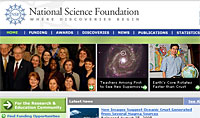 The boffins at the US National Science Foundation (NSF) have proposed “re-engineering” the Internet to create a whizz-bang updated version that connects all kinds of devices with built in security and robustness.
The boffins at the US National Science Foundation (NSF) have proposed “re-engineering” the Internet to create a whizz-bang updated version that connects all kinds of devices with built in security and robustness.
With the government agency challenging researchers to look at the Internet as a “clean slate”, the NSF’s Global Environment for Networking Investigations (GENI) initiative proposes a research grant program and an experimental facility to test new Internet technologies.
NSF officials trumpeted the GENI project at a conference for the Special Interest Group on Data Communications in Philadelphia last week.
But before you get too excited about this new super-improved Internet being piped into your devices (ooo-er), NSF spokesman Richard “Randy” Vines has some news for you: it’s not yet funded and it’s only “an idea under consideration.”
With the Internet continuing to grow exponentially and with researchers predicting an explosion of data in the next decade from mobile and wireless devices as well as sensors, the GENI project intends to anticipate and envision the Internet society’s needs 15 years or more from now.
 The goals of the GENI Initiative include a new core functionality for the Internet, with new naming, addressing, and identity architectures; enhanced capabilities, including additional security architecture and a design for high availability; and new Internet services and applications.
The goals of the GENI Initiative include a new core functionality for the Internet, with new naming, addressing, and identity architectures; enhanced capabilities, including additional security architecture and a design for high availability; and new Internet services and applications.
According to the NSF’s GENI Web page, the GENI project intends to “explore new networking capabilities that will advance science and stimulate innovation and economic growth,” adding, “The GENI Initiative responds to an urgent and important challenge of the 21st Century to advance significantly the capabilities provided by networking and distributed system architectures
The site also urges the enabling of “new classes of societal-level services and applications”. We’ve no idea what that means, but it sure sounds good to us.
Faster transmission speeds aren’t on the agenda of the GENI Project, however, with David Clark, a senior research scientist at the Laboratory for Computer Science at the Massachusetts Institute of Technology sagely commenting, “Making a network faster has never made it more secure or easier to use.”
National Science Foundation
NSF Global Environment for Networking Investigations